| |
"He was a great collaborator because he knew a lot about script. And a lot about producing. We became very good friends. I have nothing but respect for him...He was very well-read, entirely self- educated. He taught me an awful lot. I learned more about stunt work from him, because he was a terrific stunt man. Burt really knew more about how to make a movie than anyone I ever met. What I learned from Burt was to have the courage to take my time. To really rehearse the scene, to examine it." |
| |
Director John Frankenheimer on Burt Lancaster* |
As I said in my review of Brute Force (incidentally also a film which featured Burt Lancaster as a prison inmate); "Firstly a small confession... I adore prison movies and I don't know why. Perhaps the emotions found in stir are universal and primal. As correctional establishments go, prisons are not high on anyone's list of places successful at any kind of rehabilitation. Prisons tend to make prisoners hardened, more cynical and significantly less 'corrected'." There are not many films that highlight the negative aspects of the penal system as well as The Birdman of Alcatraz. This is partly because of the honesty of its protagonist (yes, he has murdered people but he has his own moral code, one which he never violates) and the duration he spent inside, a crushing weight of time that would have broken most people. My distant memories of this extraordinary film have not done the work justice. And justice is at the very core of this remarkable piece of work. The Birdman of Alcatraz is a film made in 1962, while its subject Robert Stroud was still in prison. He was to die a year later after 57 years of incarceration, 42 of those years in solitary confinement (not The Great Escape tiny, no-bed box room in total darkness, but the normal cell with hardly any contact with anyone else). Stroud never got to see the film. Before you sharply breathe in with disbelief as to what this monster must have done to deserve such a fate, here are the facts. Apologies. Here is the pertinent information via Wikipedia. At the age of 18, he made his way to Alaska where he met and 'managed' a prostitute. After she was mistreated, he bludgeoned the offender unconscious and then finished him off with a bullet. To his credit (uh... OK), he went straight to the police with the gun and took the consequences on the chin. He got 12 years for manslaughter but prison brought out the psychopathic monster in Stroud. After a series of violent encounters, he stabbed and killed a guard after the man refused to withhold reporting a minor breach of the rules, a breach that would deny Stroud a beloved brother's visit (in the movie, it's the risk of his mother's visit that's violently reacted against). It's all down hill after that. He starts on the wrong side of a warden and never really budges for decades but despite this, three sparrow chicks (real birds, oh seekers of sexism) found in the exercise yard change his life. In the movie, it's just the one. His epiphany and transformation from a psychopathic murderer to an ornithological genius may not excuse his crimes but they do call into question the very meaning of the term 'rehabilitation'. Just for information's sake, this is its definition:
rehabilitation | noun [mass noun] the action of restoring someone to health or normal life through training and therapy after imprisonment, addiction, or illness • the action of restoring someone to former privileges or reputation after a period of disfavour:
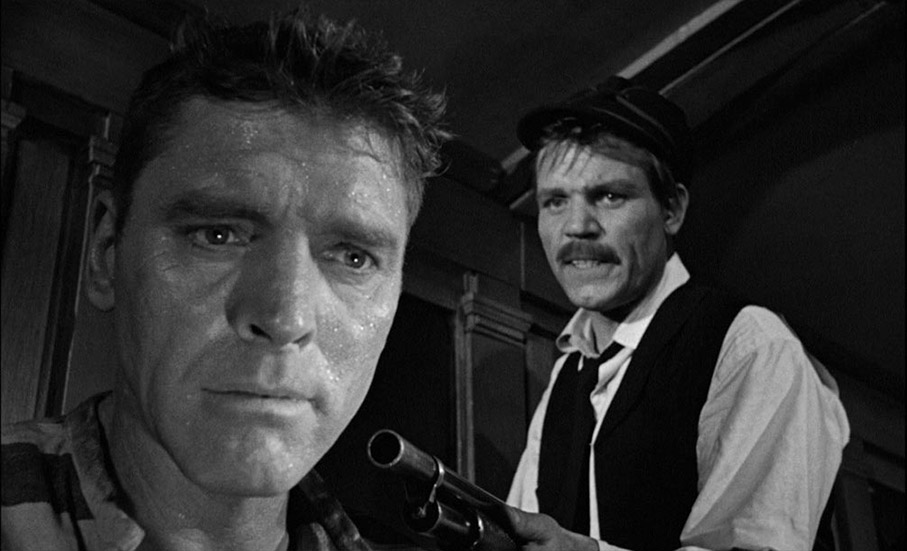
Stroud has reason to quote this back to the warden who proved to be his nemesis after... Wait, getting ahead of myself. Suffice to say that the US penal system from 1909 to the 60s followed a programme of spirit breaking and forced compliance to conformity, a negative and soul crushing drudgery Stroud was eager to reveal in a book that as far as I can discern never saw the light of print. I'm wrong. It was published in 2014 in Kindle and paperback under the title Looking Outward: A Voice From The Grave. The primary prison debate can be summed up thus; "Do we punish inmates for their crimes, deny them any dignity or individuality or does the state have a duty to encourage them to step on to the road to rehabilitation?" Or a bit of both? Let's just say that the definitive answer to that question is still to be found.
Director Frankenheimer comes under fire from Andrew Sarris in his seminal tome The American Cinema. His paragraph on the man sits beneath the subtitle of 'Strained Seriousness' and Sarris goes on to berate the director for bringing television's tropes into the hallowed halls of cinema. Not sure he got that quite right. The Manchurian Candidate and The Birdman of Alcatraz are two of the finest examples of American cinema of their time. I'm not going to cut Frankenheimer some slack from Sarris' withering assessment. I'm going to let him own the whole damn rope. Birdman is a long film and I was going to re-watch it in two segments with other commitments gnawing at my spare time. Guess what? Every scene is a winner and the film is as compelling as any comparable drama of its day and is surprisingly moving. There's a scene at the halfway point that made me wonder what on Earth had got into my eye (and the other one).
Lancaster owns this film in all of the best ways. He's playing an angry psychotic monster and his portrayal only opens the door to sympathy as far as its short defensive chain would allow. But it's enough. We sense that to Lancaster, Stroud's acts are those born from the upholding of a personal code and logic that serve the character's cinematic presentation well. Some have suggested that the film soft-peddles the monster but society and the prison system never did despite the fact that he proved himself worthy of parole many times over but would not play the warden's game. Here was a man who had devoted his cell-bound life into a sentence of unending enquiry and emerged decades later as an ornithological hero to many. His avian enthusiasm begins when he spots a lone sparrow floundering in a nest, driven to the ground by a storm. He takes the bird in and slowly nurtures it back to health. Allowed to keep the bird by a sympathetic new warden (nothing quite like a sparrow pulling a cardboard cart back and forth to soften the penal heart), Stroud gets into birds in a big way. Other prisoners granted the same privilege soon give up their birds to Stroud's care. Before long, Stroud is an aviary caretaker with little room for him to live his own already confined and narrow life behind bars.
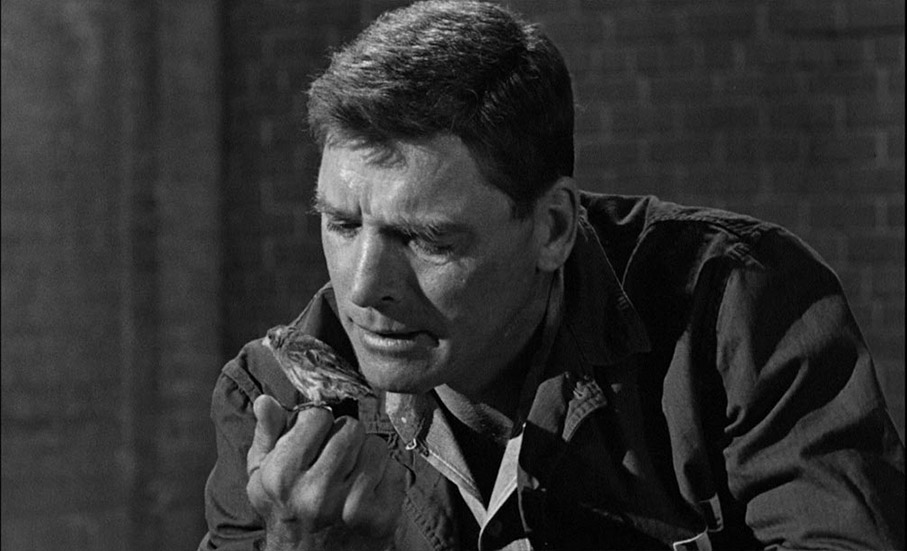
Stroud is never sentimental about his birds. Like a true scientist, he accepts truths however unpalatable and recognises that problems are there to be solved and not to be defeated by. Time inside prison was subsequently mutated into avian scientific discovery. He wasn't in prison, just a small laboratory, and his work wasn't stuffing dirty clothes into giant Laundromats but investigating and finding the cure to bird ailments that had stumped so many before him. Stroud was the perfect model for the nature-nurture debate to rage anew. It's clear his mind was an exceptionally bright one, full of curiosity and intellectual rigour. But that mind was partitioned neatly; on the one side a code of conduct of morality that was enforced by violence, a side sullied and twisted by emotional angst strongly connected to his mother. The contents of that other partition were, of course, that which gave birth to the 'Birdman of Alcatraz'. If leavened by softer and supportive experience, he would never have languished those many years in confinement. His temper was legendary and therefore his course well foreseen. Stroud violently punished those who did him wrong. Yes, he was a murderer but he didn't deliberately thrill-kill like a Ted Bundy or a Jeffrey Dahmer. His victim's deaths were the unfortunate results of his sense of justice as ironic as that sounds. But if the portrayal of Stroud is in any way accurate, he had honour and integrity and in some ways made you look at a killer with a few ounces of compassion. If your passion was birds that weight was multiplied many fold.
Frankenheimer's direction is unfussy and studiously avoids calling attention to itself. It does what it does in complete service to the tale being told. Invisible technique, usually in the purview of the editing, extends to the camera operation (a vigorous nod to Richard H. Kline – see the Fiction Factory Extra - and James Saper under the wing of the cinematographer Burnett Guffey). There are some camera operations in this film that are astonishing. It's a shame they are so invisible. Do you know how much skill (with, granted, a dab of luck) it takes to shoot a bird and perfectly pan with it as it flies to an upturned palm and end the move perfectly still? A clue? More than a lot. Yes, you have to take multiple takes but when you get the shot it's like the animal is on your wavelength. True story; I once set some nuts down on a branch to entice a squirrel into shot. The cameraperson was ready and frankly as disbelieving that my technique would work as everyone else around me. This is the absolute truth. "John, you have the frame? OK, turn over... Sammie squirrel? Action!" The squirrel then walked into frame picked up a few nuts and after a few seconds I added "OK, Sammie. That's enough, exit frame left." Sammie looked up and then scarpered out of frame left. I said "Cut!" John stopped the camera and slowly turned towards me. "You jammy bastard!" he said. It was true but the feeling's great when that stuff works.
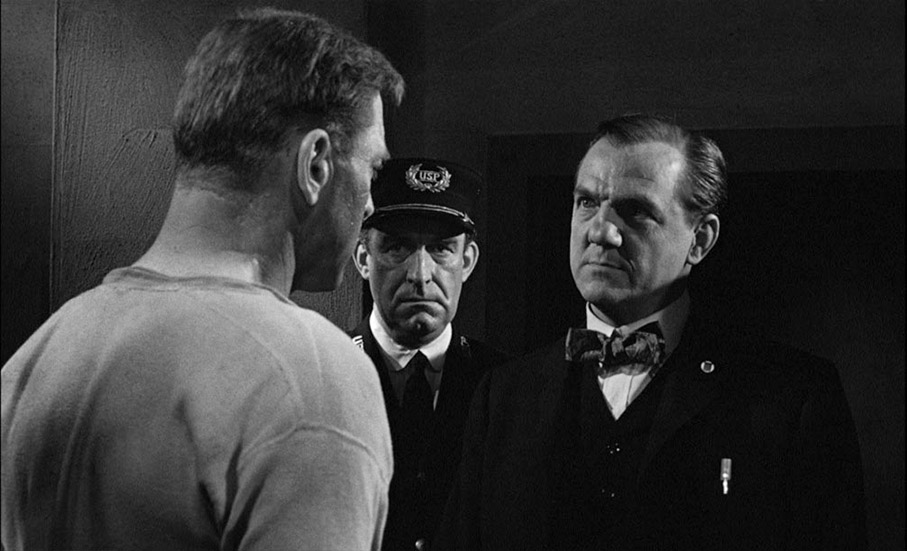
Lancaster is very well supported. The ever-dependable Karl Malden plays the warden, Harvey Shoemaker (historically an amalgam of the many wardens Stroud butted heads with). He's a character under the powerful illusion that he's doing the right thing. He displays the same rigidity of belief as Stroud so it's the immovable object going up against the unstoppable force, a half-century stalemate. Stroud's mother, a black widow of a character, starts the film heroically and over the years develops into a cold, possessive monster. Up until this role, Thelma Ritter had specialised in lighter parts but proves here that typecasting may have its benefits but perhaps not for the actor concerned. Breaking type didn't hurt Hugh Laurie's career. He went from English gent to American misanthrope without pausing for breath. A young but all too recognisable Telly Savalas plays Gomez, the only inmate Stroud has any dealings with. Always smoking, Savalas appears to be really enjoying himself in the role although I wish he handled his birds a little more gently. In the film's most moving scene, Stroud meets up with Stella (Betty Field), a bird fancier who just has to meet this extraordinary man whose work she so admires. Her courage in the face of a killer marks her down as strong and therefore worth Lancaster's affection. Finally there's Stroud's partner in prison, his guard Bull Ransom, played an actor ignored by the Academy at the time. The commentary participants seem to think that he was too well known as a TV actor to gain cinematic recognition. Neville Brand is superb in the film and does more to effect the transformation of Lancaster from murderer to bird enthusiast than anyone else save Lancaster himself. Director Frankenheimer knew that the smaller pleasures of this relationship yielded the most powerful exchanges. Small gestures are amplified in the prison context and are all the more potent for it.
At 55 minutes and 42 seconds, we get a 2 minute and 17 second bird hatching shot. It was originally one shot or spread over two 35mm magazine changes (you get about 11 minutes per standard magazine shooting at 24 frames per second) with the technicians being careful not to disturb the camera or lighting set up. From first visible crack to getting free of the egg, the shot at first glance seems to be genuinely one shot. Well, it is genuine, just somewhat compressed. I counted at least ten well-disguised edits. The giveaways are; a miniscule lighting difference from one frame to another; a bird position which appears to jump a short distance; and a frame shift, a tiny one but a physical cut registers sometimes travelling over the smoothest gates. I've been editing film and its digital equivalent since 1983 so you get to notice these things. For completists, watch out for those cuts at 56 minutes (37/42/49/53 seconds) and 57 minutes (05/12/25/30/40/48 seconds).
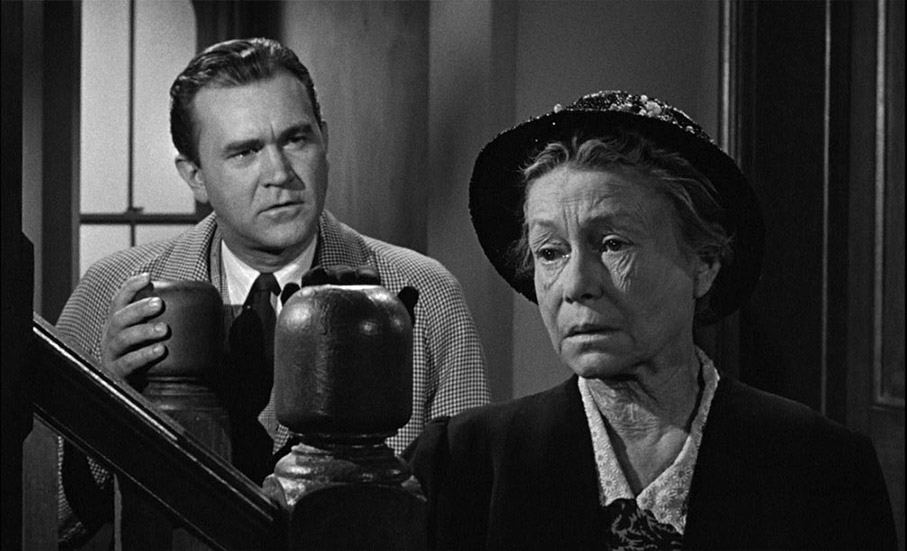
The Birdman of Alcatraz is a cracking film, full of strong drama, superb performances and is surprisingly moving at times. Despite terrific supporting performances, it's Lancaster's show and what a show.
Presented in its original aspect ratio of 1.66:1, this black and white gem is gorgeous to look at. When cinematographer Burnett Guffey pulls out the chiaroscuro stops, the film sings. Blacks are black but the detail is there when it's needed and the contrast ratio pleasing. There is very little normal film damage except for one shot at 03' 31". The exterior night shot of a train is clearly a library shot – very dirty and several generations away from an original negative. It's either that or Frankenheimer's crew were pretty cack-handed with the original negative. At 38' 53" there's an odd jump cut mid-shot as if someone has snipped out a frame and at 45' 50" a join judders through the gate warping the image. It's only four frames or so but it comes exactly at one of the most emotional moments of the film – Stroud says to his long time guard "I think you're absolutely right..." and then the cut to the guard is precise giving him time to process this sliver of light from a dark, dark man. I didn't want the film to call attention to itself at that point then but it's such a small thing. Pay it no heed. It's just that we like to be thorough at Outsider.
The LPCM mono soundtrack is crystal clear and there are optional English subtitles for the deaf and hard-of-hearing.
Audio commentary with film historian and editor Paul Seydor, moderated by Twilight Time's Julie Kirgo and Nick Redman
Now this is more like it. This commentary should serve as a template for more of the same. Why? This isn't a group of three fans salivating over how good the film is. This commentary offers something commentaries do not usually provide – drama! Conflict creates drama and with Kirgo and Seydor, we have moments of different opinions and although it's good-natured and beautifully orchestrated by Redman's soothing tones, there is some fire and sparks sometimes fly. It's great to get that sort of balance. Kirgo is, to a small degree, somewhat compromised by her love for the film and its leading man and Seydor has many, sometimes conflicting opinions based on the number of times he's seen the finished film. The team deal with the history and dark nature of Stroud and the harsh realities of shooting birds (no humane association on hand in 1962). If a bird 'dies' and falls off a perch, that's the real thing. Insects don't get too many breaks in the movie either. They note that 1962 seems to have been an amazing year for world cinema and the three cover the extraordinary shot of the hatching bird and Seydor (the film editor) must not have been watching closely but as I mention in the review there are almost invisible cuts in this 'single shot'. I say almost. At the close, there is a lovely exchange about modern Hollywood between Kirgo and her sparring partner that goes something like this... (and she echoes my feelings on this topic too);
| Kirgo: |
Sentimentality is a dirty word, and there's no real human feeling these days... |
| Seydor: |
Trying to find 'people' in Hollywood, they don't exist!' |
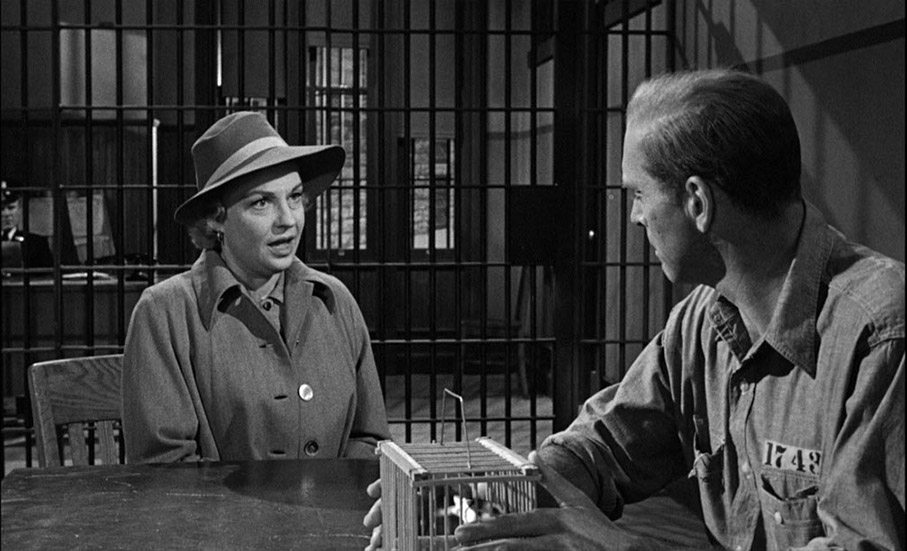
From that exchange, do you get the impression that Mr. Seydor is now retired? Well, at over 70 he's still working according to his IMDb entry. But there seems to be precious little love lost between him and Tinseltown. This is a great commentary by knowledgeable and compatible people with a dash of conflict as a spice, one every commentary should have.
Fiction Factory: Illusion of Freedom: Richard H. Kline on John Frankenheimer's Birdman of Alcatraz; a new video piece on the film (28' 26")
When this was made in 2015, Richard Kline was 89 years old and speaks with the passion and the articulacy of a man a third of his age. Check out his IMDb credits. That's one hell of a career. I have already mentioned the man's almost supernatural camerawork, getting a Mitchell 35mm monster to pan a bird in flight and stop stock still. All credit to you, Sir. He tells us about what is obviously a highly regarded movie on his CV. Once again, these extras are all so marvellously complimentary not in the sense of gratitude but the fact that the information they each convey compliments what's offered from the other main two extras. Kline focuses on production, Lancaster's process (he was 49 years old at the time of shooting and had to play a 20 year old right up to 70... it's a far more impressive achievement, one you take for granted. Bravo, hair and make up, Robert J. Schiffer). It's such an amazing shock to see a colour production still and then another after being immersed so deeply in a black and white world. It's a lovely detail that the colour film stocks needed so much more light, an amount that the birds couldn't handle. This gorgeously shot black and white movie was a choice made because of the birds' metabolisms. What a lovely detail. This extra is crammed with them.
An exclusive new video interview with film historian Sheldon Hall (35' 30")
In an almost unbroken presentation in a mid-shot to camera right the enormously well informed and well-prepared Sheldon Hall gives us the overview on the genesis, production (all three stages) and post-production of Birdman of Alcatraz. It fills in all the gaps that the commentary may have created but then you can never have the whole story but this one comes close. In fact the real Stroud is revealed as more of a monster given historical facts and far from list the surprising ones, just watch the movie and see this extra and remember how history can be perverted in the name of entertainment. I'm not saying that's a bad thing or immoral but as Hall says, the movement to get Stroud paroled in the latter stages of his life was predicated on the idea of granting said parole to Burt Lancaster, the man Stroud appeared to be to the cinema-going public. A fascinating accompaniment to the movie and vital if you're at all interested in the detail of the history of this amazing story.
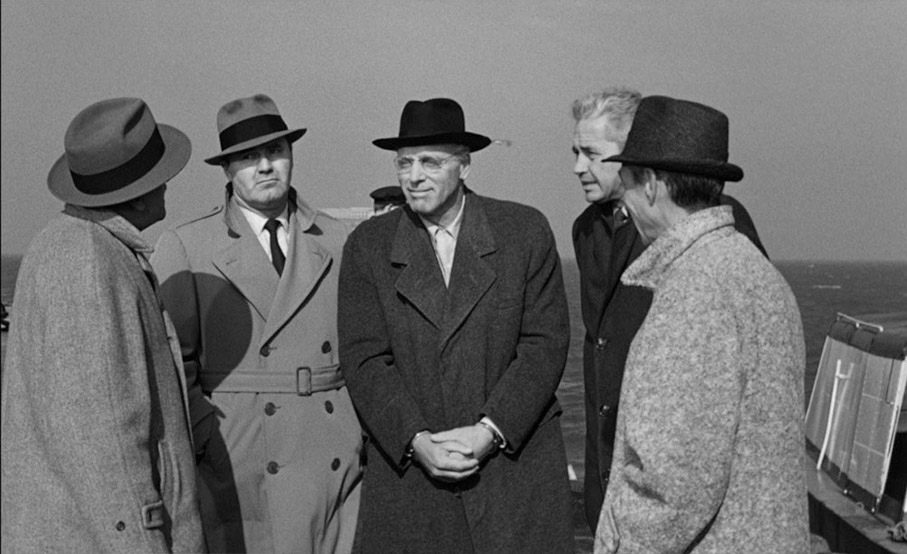
Original theatrical trailer (3' 04")
This is an earnest and cleverly structured trailer identifying Stroud as still alive (as of course he was then) and in turns, an American, a convict, a genius. The use of his "You'll never break me," speech with the Warden sets the anticipation up nicely. Stroud is eventually tagged as "the most defiant man alive," which may have appealed to the rebel in all of us but Lancaster was the draw here and the trailer exploits his persona to the max. It's interesting to consider if Patrick McGoohan had seen this trailer or the film five years before setting out on his series The Prisoner. The genesis of his own No. 6 character is in the scene in the trailer. The dialogue if not the same certainly contains the rebellious mood... "I will not be pushed, filed, stamped, indexed, briefed, debriefed, or numbered." Indeed. Neither will Burt.
A collector's booklet featuring new writing on the film by Travis Crawford, as well as a selection of archival imagery from the film's production
Not available for review, the booklet is doubtless a fine addition to the Blu-ray. I've not seen one that ever failed to add more layers and appreciation to the movie in question.
The Birdman of Alcatraz is a somewhat tempered portrait of a real monster but a rehabilitated one, a man whose own moral code allows him to commit a murder and accept the consequences. He commits a further killing because of his ferocious temper and pays that price too on his own terms. He had the will to take society's subsequent punishment and after becoming interested in birds, he discovered an aspect of himself that diluted his darker side. The Birdman of Alcatraz is surprisingly moving and is a stunning and heartfelt portrait of a real man played by an actor not known for revealing his cinematic sensitivity. The film is in most ways Burt Lancaster's and he runs away with it. Highly recommended.
|